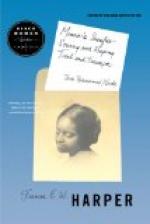“What say you, Annette, would you blame me if I accepted this release?”
“I certainly would. She is your lawful wife. In the church of her father you pledged your faith to her, and I do not think any human law can absolve you from being faithful to your marriage vows. I do not say it lightly. I do not think any mother ever laid her first born in the grave with any more sorrow than I do to-day when I make my heart the sepulchre in which I bury my first and only love. This, Clarence, is the saddest trial of my life. I am sadder to-day than when I stood a lonely orphan over my grandmother’s grave, and heard the clods fall on her coffin and stood lonely and heart-stricken in my uncle’s house, and felt that I was unwelcome there. But, Clarence, the great end of life is not the attainment of happiness but the performance of duty and the development of character. The great question is not what is pleasant but what is right.”
“Annette, I feel that you are right; but I am too wretched to realize the force of what you say. I only know that we must part, and that means binding my heart as a bleeding sacrifice on the altar of duty.”
“Do you not know who drank the cup of human suffering to its bitter dregs before you? Arm yourself with the same mind, learn to suffer and be strong. Yes, we must part; but if we are faithful till death heaven will bring us sweeter rest.” And thus they parted. If Luzerne had felt any faltering in his allegiance to duty he was too honorable and upright when that duty was plainly shown to him to weakly shrink from its performance, and as soon as his wife was able to travel he left A.P., for a home in the sunny South. After Luzerne had gone Annette thought, “I must have some active work which will engross my mind and use every faculty of my soul. I will consult with my dear friend Mrs. Lasette.”




